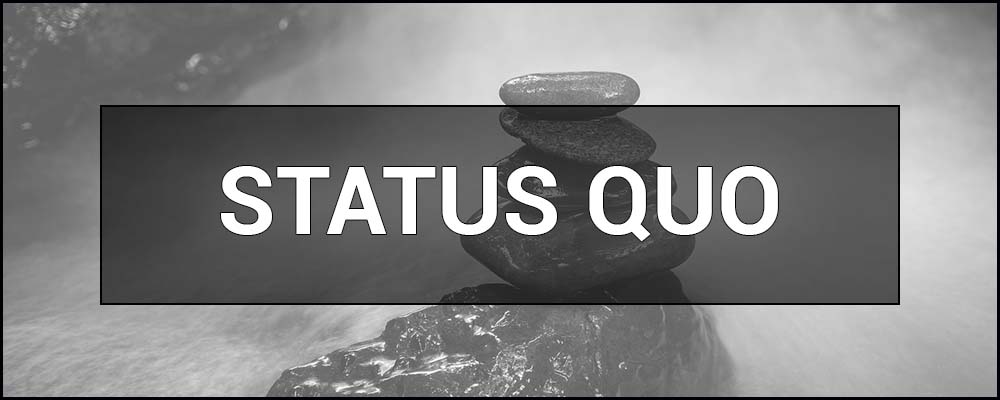The status quo is the existing and usual state; the current way things are, especially with regard to political or social issues and situations.
What is the STATUS QUO – definition and meaning in simple words.
In simple terms, the Status Quo is a state of affairs that exists at a certain time, especially in contrast to another possible state of affairs.
This phrase is often used in negotiations over various conflicts. For example, if there are two hostile parties seeking to reach a certain consensus and make peace, then you might hear a phrase like:
Before we are ready to negotiate further, we must return to the status quo.
Literally, this means that in order to resolve the situation or continue peace negotiations, it is necessary to restore the natural state that existed before the conflict, i.e. to return to the starting point.

The origin of the phrase status quo.
The phrase comes from Latin, which means and literally translates as “the state in which”. It is most often used in legal terminology.
As the Oxford English Dictionary explains, the concept of status quo appeared for the first time in the fifth century in the works of Augustine of Hippo (St. Augustine) and was probably changed from in statu quo (in the state in which). The same dictionary says that the term status quo may have been formed by shortening the phrase status quo ante bellum, which means “the state of affairs before the war.”
Status quo in international politics.
The status quo is the relative legal position of the parties at the end of armed hostilities and the starting point of their future international relations. It is a useful tool for resolving territorial disputes.
The status quo embodies neither a general principle of law nor an autonomous rule or principle of international law for the management of international relations. It has no direct normative force in itself. Rather, the term status quo describes a factual or legal situation at a given moment in time, a situation that can be the object or point of reference for normative rules under international law.
Status quo in jurisprudence.
The term status quo is often used in court cases. For example, a judge may issue a status quo order to prevent any action by either party involved in a dispute until the matter is resolved. It is aimed at preventing harm or preserving existing conditions so that the parties’ positions are not prejudiced until a decision is made.
- In the context of family law, a status quo order may be issued to prevent one parent from evicting a child from the home without the consent of the other parent. The other parent may seek to maintain the status quo. Such an order is intended to protect the child during a custody dispute until the parties can mediate a parenting plan or until the court has sufficient evidence to make a temporary custody decision.
- In the context of labor law, the status quo can be used to prevent dismissal or discrimination against employees after a complaint is filed. The order may require the employer to cease negotiations and prohibit the employer from changing wages, hours of work, and all existing terms and conditions of employment.

Status quo bias.
Status quo bias is an emotional preference for the current situation. Status quo bias can cause people to make seemingly irrational decisions to stay in a suboptimal situation. In a sense, it is very similar to the Duckling Syndrome.
Examples of status quo bias:
- Choosing the default option. When given a choice, people are more likely to stick with the current default option. For example, two US states, New Jersey and Pennsylvania, offered two options related to insurance legislation. One option is more expensive, with unlimited rights to file a lawsuit. The other option is less expensive but with limited rights of action. In New Jersey, the default option was the cheaper version. Most citizens chose it. In Pennsylvania, the default option was the more expensive version. Most citizens chose it.
- Advantage over old plans. In Germany, a small town had to be relocated due to a mining project. The townspeople were offered many interesting plans for the location of the new city, but citizens voted for a plan that closely resembled the old version.
- Commitment to the brand. Sticking to recognized brands is an example of status quo bias.

Why do people prefer the status quo?
- The endowment effect. In behavioral economics, we can observe how people prefer to give more weight to what they already have. We get attached to our current situation.
- Fear of the unknown. People do not like uncertainty and do not want to take risks when making choices.
- Costs of choice. Let’s say you drink coffee at Starbucks every day. The coffee is good. It could be better, or it could be worse. If you go to another city, Starbucks will offer you the same quality there. Going to a different store means you have to be more careful about the quality. Going to Starbucks (what you are used to) reduces anxiety about choice. Interestingly, Samuelson and Zeckhauser (1988) found that people prefer the status quo more often the more choices they have. This suggests that the more choices there are, the higher the cost of decision-making. This makes the status quo even more attractive.
- Inertia. People may simply not want to change something out of inertia.
- Commitment. If we experience something every day, we develop attachment.
- Loyalty. One of the aspects of human nature is loyalty. If we support one sports team, we don’t want to change. We continue to support it in both good and bad times. Loyalty is seen as a good quality. Changing may indicate a lack of reliability.
Status quo bias, rational or irrational?
If we stick with the current choice to avoid decision-making costs, then this can be seen as a rational choice because we save on computational costs. However, if we refuse to consider alternatives on the grounds that we want to stay with what we have, it becomes irrational. By knowing how status quo bias affects your decisions and behavior, you can look for ways to reduce bias in the choices you make every day.
Change can be frightening for many people, so many would prefer things to stay the same. When change does occur, people tend to perceive it as a loss or harm. You may have heard the phrases: “That’s the way things are” or “That’s the way things are done here”. Just because something has been done a certain way for a long time does not mean it is the best or even a good way to do things. A passion for the status quo can make people resist change, which can also strongly influence the decisions they make.

Status quo in business.
If you want to be a leader in a successful business team, you shouldn’t think only about the status quo, but also about something great, because great things never happen with the status quo. Of course, there are times when maintaining the status quo may seem like a great goal and a great victory. However, in the long run, maintaining the status quo in business is a losing strategy. Take the advice of Gary Wimberly, Senior Vice President of Express Scripts:
The things that got us where we are today will not get us where we need to be in the future.
This is a great piece of advice to keep in mind.
FAQ (Frequently Asked Questions):
Status Quo refers to the existing state or condition of a particular situation or system, particularly when it is seen as undesirable or unfavorable.
You can use Status Quo in a sentence to describe a situation or system that has not changed for a long time, such as “The company’s management is resistant to change and wants to maintain the Status Quo.”
The opposite of Status Quo is change, which implies that something is different from the existing state or condition.
The Status Quo is important because it represents the starting point for any changes or improvements that may be necessary in a given situation or system.
The Status Quo can influence decision-making by providing a frame of reference for what is considered normal or acceptable, and by making it more difficult to deviate from established patterns of behavior or thinking.
The Status Quo can shape societal norms and expectations, and can be a powerful force in maintaining the status quo in areas such as politics, economics, and culture.
Examples of the Status Quo in society might include established political parties, entrenched economic systems, and traditional cultural practices.
The Status Quo can be challenged through activism, innovation, and social movements that seek to create change by disrupting existing power structures and patterns of behavior.
Tradition refers to established customs or practices that are passed down from one generation to the next, while the Status Quo refers to the current state or condition of a particular situation or system.




